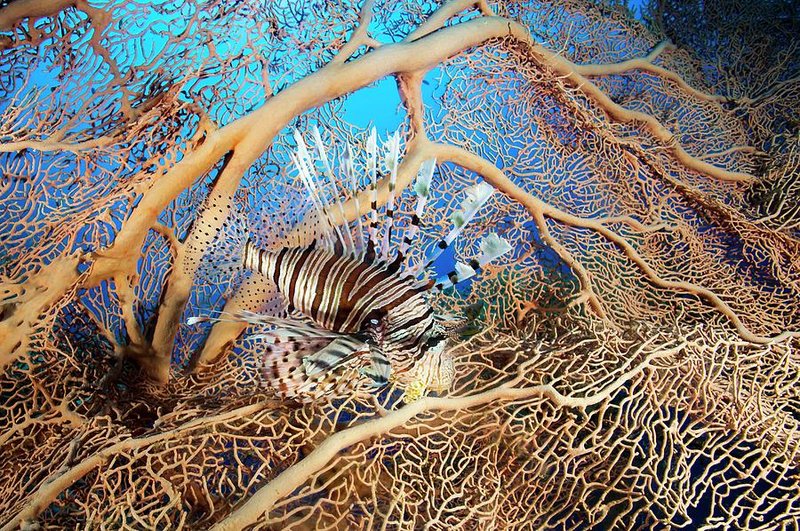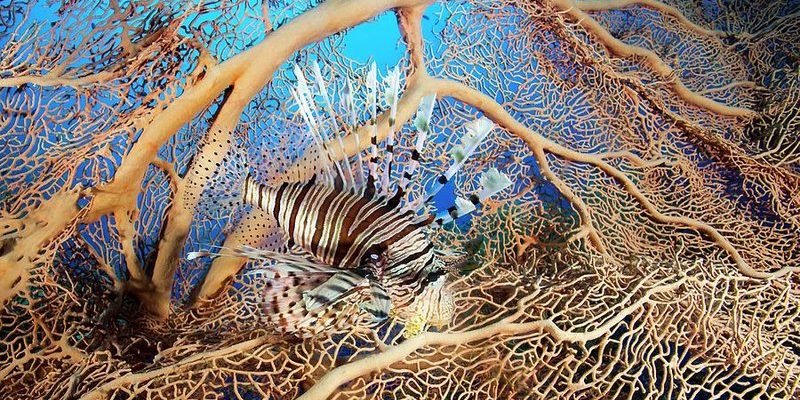
Imagine a bustling coral reef, alive with colors and activity. Each species plays a role in this intricate dance of life. Now, enter the lionfish—a visually stunning predator that can disrupt this harmony. As we explore the relationship between lionfish and coral reefs, we’ll uncover whether they can coexist peacefully or if they pose a threat to this beautiful underwater landscape.
What Are Lionfish?
Lionfish are an exotic species known for their dramatic fins and vibrant stripes. Originally from the Indo-Pacific region, these fish have made their way to the Atlantic Ocean, where they’ve established a reputation as effective predators. Their captivating appearance—complete with venomous spines—makes them one of the most recognizable fish in the ocean.
These fish thrive in a variety of marine environments, including coral reefs. Lionfish have a unique hunting strategy: they use their fan-like fins to corner smaller fish, making them extremely effective hunters. However, this predatory nature raises questions about their impact on local ecosystems, especially coral reefs.
You might be surprised to learn that lionfish can reproduce rapidly, laying thousands of eggs every few days. This high reproductive rate contributes to their increasing population in areas where they’re considered invasive species, leading to concerns over the balance of marine life.
What Makes Coral Reefs Unique?
Coral reefs are often referred to as the “rainforests of the sea,” and for good reason. These vibrant ecosystems are home to thousands of species, including fish, invertebrates, and even plants. They provide essential services, like protecting coastlines from erosion and supporting fisheries.
Corals themselves are fascinating organisms. They consist of tiny, individual polyps that form large colonies. Each polyp secretes calcium carbonate, building the hard structure we recognize as coral. This process takes years, making coral a delicate ecosystem that can be easily disrupted by environmental changes.
The health of coral reefs is crucial not only for marine life but for humans too. They promote biodiversity and support local economies through tourism and fishing. This makes understanding the interactions between lionfish and coral reefs even more vital.
How Lionfish Affect Coral Reefs
The primary concern with lionfish is their predatory behavior. As they hunt smaller fish, they can significantly impact local fish populations, which may include crucial herbivores that help control algae growth on coral. An increase in algae can smother coral, blocking sunlight and harming the reef’s health.
Moreover, lionfish can adapt to various habitats, allowing them to thrive in both shallow and deep waters. They can outcompete native species for food and territory, leading to declines in biodiversity. In simple terms, more lionfish mean fewer local fish, which can weaken the entire reef ecosystem.
Here’s the thing: while lionfish don’t directly harm coral through physical means, their predation has a broader impact that can lead to a less healthy reef. This creates a concerning cycle where the coral struggles to thrive.
Compatibility: Can Lionfish Live in a Reef Setting?
When it comes to compatibility, the answer is nuanced. Lionfish can technically coexist with coral reefs, but it’s not without consequences. They may inhabit the same areas as other fish species, but their aggressive hunting can displace native fish that play essential roles in maintaining the health of the reef.
Some argue that lionfish have found a niche within these environments, particularly in areas where native fish populations have already been diminished. However, this doesn’t negate the long-term impact they have on coral health. Without proper control of their population, lionfish can contribute to an imbalance that affects both fish and coral alike.
If you’re considering adding lionfish to a home aquarium with corals, it’s crucial to conduct thorough research. Make sure their presence will not lead to adverse effects on the overall ecosystem balance in your tank.
Managing Lionfish Populations: What Can Be Done?
Addressing the lionfish invasion is critical for coral conservation efforts. Several strategies are being employed to manage their populations.
- Harvesting: Encouraging recreational fishing to reduce lionfish numbers can help. This not only lowers their population but also promotes awareness about the issue.
- Education: Raising awareness in coastal communities about the threats posed by lionfish and how to properly handle them can empower locals to take action.
- Management programs: Implementing regulations to monitor lionfish populations and promote sustainable fishing practices can help balance the ecosystem.
By managing lionfish numbers effectively, we can protect coral reefs and promote healthier marine environments. This way, we offer our beautiful ocean ecosystems a fighting chance against invasive species.
The Future of Coral Reefs With Lionfish
The future of coral reefs in the presence of lionfish depends on our collective efforts. While these intriguing fish can cause disruptions, they also inspire responses that can strengthen conservation initiatives. By recognizing the complexity of their role within coral ecosystems, we can forge paths toward better management and a healthier ocean.
It’s essential to keep a close watch on lionfish populations, as their presence poses a genuine threat to the biodiversity of coral reefs. Collaborating with local communities and marine organizations can lead to more robust strategies for managing their populations effectively.
As we work together, there’s hope that coral reefs can continue to thrive, supported by diverse marine life, including both lionfish and the native species that enrich the underwater world.
In conclusion, understanding whether lionfish are reef safe is more than just a yes or no answer. It’s about recognizing their impact, evaluating management strategies, and protecting the delicate balance of our ocean ecosystems. By staying informed and taking action, we can play our part in preserving the beauty and health of coral reefs for generations to come.

